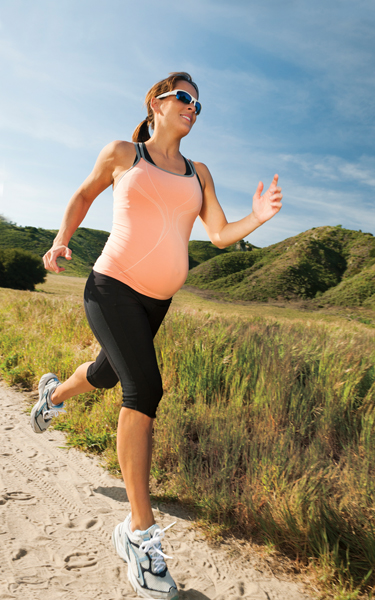Exercise during pregnancy is more important than you think

Pregnancy can be challenging, both mentally and physically. If this […]
I am currently awaiting the birth of my fourth child. With each pregnancy, I’ve learned so much and experienced different nuances of the condition. This time around, I’ve tried to stay on top of my diet and maintain regular exercise. With a busy schedule and three young kids to take care of, I need the energy and clarity of mind that come with these habits. In researching this topic, I’ve learned more about the mind-body impact of exercise, and I’ve picked up a few pointers I wish I’d known sooner …
How exercise can help
Pregnancy is often a joyful time in a woman’s life, but it can be downright stressful, too. Balancing responsibilities, changing roles, shifting relationships … it all comes with the territory when you’re becoming a parent. Stress is hard on mom, but it’s also hard on baby—he is less likely to thrive in the womb when he’s being fed stress-induced cortisol. Extreme stress can even result in preterm delivery and low birth weight.
If you’ve previously endured bouts of anxiety or depression, these may reappear or worsen during pregnancy as well, due to the stress of pregnancy and out-of-whack hormones.
Stress, anxiety and depression can all be alleviated—at least in part—by regular exercise. In the book Spark: The Revolutionary New Science of Exercise and the Brain, author John J. Ratey, MD, says, “Physical activity lowers stress and anxiety and improves mood and overall psychological health during pregnancy.” While precise results vary from person to person, nearly every expectant mama can elevate her mood through exercise.
In addition to the mental benefits, the physical perks of exercise during pregnancy are nearly boundless: increased energy, better sleep, decreased risk of certain pregnancy complications, less pain and more regular bowel movements, to name a few. Then there’s the weight management aspect—staying within the recommended weight gain guidelines means you’ll have less to lose down the road. Of course, keeping your body strong also carries the potential of an easier delivery and a quicker recovery after baby’s birth (although there are no guarantees in the delivery room).
Getting started (and keeping going)
The Centers for Disease Control and Prevention (CDC) recommends that pregnant women get at least 150 minutes of moderate-intensity aerobic activity every week, which breaks down to 30 minutes, five days a week. When they specify “aerobic” activity, they’re talking about full-body, continuous movement that gets your heart rate up. If you’re not in the habit of exercising, 150 minutes a week can sound daunting—start small and work your way up!
Erica Ziel, founder of Knocked-Up Fitness and The Core Rehab Program, says, “As you start your day, get up and do your favorite exercise for a few minutes; then you’re likely to do more throughout the day.” Yoga, stretching and moderate weight lifting are helpful during pregnancy, each offering individual benefits such as flexibility, improved circulation and increased strength. Yet the best feel-good exercises are those aerobic exercises that push you a little more and lead to greater endorphin release. Endorphins work like natural morphine in the body, says Ratey, dulling pain and producing “euphoria in the mind.” Instant mood enhancement!
During pregnancy, aerobic exercise may include brisk walking, swimming, cardio or dance classes, elliptical training, stationary biking and possibly running if your body tolerates it well. “Don’t be afraid to change things up as your mood and trimesters change,” says Krysta Crane, a health and fitness coach and mom in Bountiful, Utah. “Pay attention to your mood, and ask yourself, ‘What do I need today?’”
When to back down
Unfortunately, there are some high-risk conditions that will put a halt to your exercising ambitions. According to The American College of Obstetricians and Gynecologists (ACOG), women should not exercise during pregnancy if they have certain types of heart and lung diseases, cervical insufficiency or cerclage, placenta previa after 26 weeks of pregnancy, preterm labor or ruptured membranes, preeclampsia, gestational hypertension, or severe anemia, or if they’re carrying multiples with risk factors for preterm labor.
Ziel offers an additional warning to moms expecting baby No. 3 or beyond. Because the uterus expands faster in later pregnancies, offering less protection to the baby, don’t engage in plyometrics or running—especially during the first trimester—as this could increase your chance of miscarriage. She suggests replacing running with elliptical training or walking on the treadmill with the incline cranked up. The goal is to work hard enough to get those endorphins flowing, without incurring undue risk.
Even if you’re experiencing none of the above and you have the green light to exercise, there are some activities that should be avoided during pregnancy. Jarring activities such as mountain biking and contact sports are out (even from the very beginning, as the hormone relaxin loosens your joints and puts you at risk of injury), as are any sports that pose a risk of falling (especially when your belly is throwing off your sense of balance)—so no downhill skiing or horseback riding.
In addition, ACOG advises to stop exercising and contact your care provider if you experience the following: bleeding from the vagina, feeling dizzy or faint, shortness of breath before starting exercise, chest pain, headache, muscle weakness, calf pain or swelling, fluid leaking from the vagina, or regular, painful contractions of the uterus.







